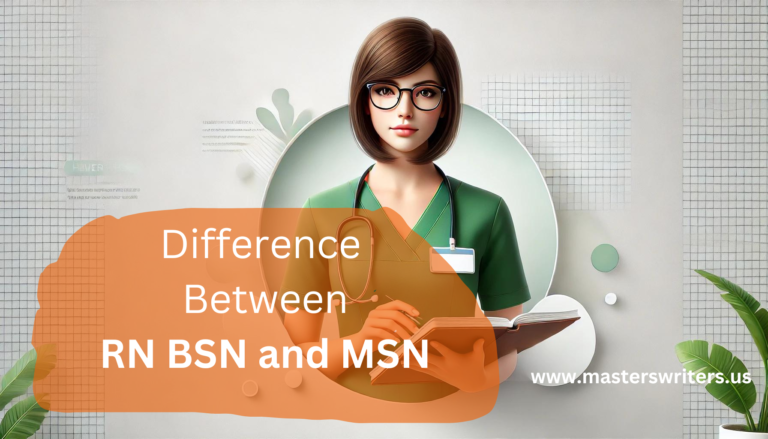Nursing
Difference Between RN BSN and MSN | Program Overview


The nursing profession provides a fulfilling career path with a wide range of opportunities to make a meaningful difference in the lives of others. If you are considering a career in nursing, you may come across the terms RN, BSN, and MSN. But what do these designations stand for, and how do they influence your career trajectory? This article will clarify the distinctions between a Registered Nurse, Bachelor of Science in Nursing, and Master of Science in Nursing, guiding you in making an informed choice about your nursing education and career path.
Overview of Nursing Qualification
Nursing qualifications span from the entry-level RN (Registered Nurse) to more advanced degrees like the BSN (Bachelor of Science in Nursing) and MSN (Master of Science in Nursing). An RN is a licensed nurse who has successfully passed the NCLEX-RN exam, which can be attained through several educational routes. The BSN is a four-year degree that provides an extensive nursing education, often favored by employers for its comprehensive training. The MSN is a graduate-level degree, generally requiring two years post-BSN, which offers specializations such as nurse practitioner or nurse educator and equips nurses for leadership positions. Let’s delve into the roles and responsibilities associated with RN, BSN, and MSN degrees to understand their significance in nursing better.

Get Your Papers Healed by Experts!
Focus on what you do best, while Masters Writers takes care of researching, writing, and delivering high-quality work that won’t make your professor faint.
Registered Nurse (RN) Role Overview
Let’s start by understanding the pivotal role of the Registered Nurse (RN), the cornerstone of nursing practice. This section will provide a concise overview of the key duties and responsibilities that characterize this vital role in healthcare.
What is a Registered Nurse?
A Registered Nurse (RN) is a licensed healthcare professional who plays a crucial role in direct patient care. They hold a foundational nursing degree and have successfully passed a national licensing examination, proving their ability to provide safe and effective care.
RNs perform a diverse range of duties. They assess patients’ physical and emotional needs, create and implement care plans based on physicians’ instructions, administer medications, monitor patients’ conditions, educate patients about their health, and advocate for their well-being.
Additionally, RNs collaborate with doctors, therapists, and other healthcare professionals to ensure patients receive coordinated and comprehensive care. Their responsibilities vary widely, from wound care and pain management to emotional support and planning for patient discharge.
What Education is Needed to Become a Registered Nurse?
Becoming a Registered Nurse involves two primary steps: education and licensure.
Associate Degree in Nursing (ADN)
This two-year program equips students with the essential knowledge and skills required for RN practice. The curriculum covers a wide range of nursing fundamentals, including:
- Anatomy
- Physiology
- Pharmacology
- Nursing Assessment
- Clinical Skills
These programs typically combine classroom instruction with hands-on experience in healthcare settings supervised by experienced registered nurses.
RN Licensing Exam (NCLEX-RN)
Upon completing an accredited ADN program, aspiring RNs must pass the National Council Licensure Examination for Registered Nurses (NCLEX-RN). This comprehensive computer-adaptive exam evaluates a candidate’s knowledge, skills, and abilities to ensure they can provide safe and competent nursing care. The NCLEX-RN is essential to obtain an RN license and practice nursing in any U.S. state.
Check out our dedicated article on how to pass the NCLEX-RN Exam.
Career Opportunities and Job Outlook for RNs
Registered nurses have diverse employment opportunities across the healthcare landscape, including:
- Hospitals
- Clinics
- Ambulatory Surgery Centers
- Home Healthcare
- Public Health Facilities
RNs can also specialize in pediatrics, critical care, oncology, emergency room care, or mental health.
The job outlook for RNs is highly promising. According to the U.S. Bureau of Labor Statistics, RN positions are projected to grow 6% from 2022 to 2032, outpacing the average growth rate for all occupations. This demand is driven by an aging population with increasing healthcare needs and the expansion of the healthcare industry. With a solid RN foundation, nurses can pursue fulfilling careers, contribute significantly to patient care, and enjoy job security in a thriving field.
You can also check out our article on the steps to becoming a nurse practitioner.
Bachelor of Science in Nursing (BSN) Role Overview
After understanding the foundational duties and rewarding career opportunities of a Registered Nurse (RN), let’s explore the next step in nursing education: the Bachelor of Science in Nursing (BSN) degree. This section will delve into the meaning of BSN and how this degree enhances the RN’s skills and knowledge, paving the way for advanced career opportunities.
What Does BSN Mean: Definition and Role
A Bachelor of Science in Nursing (BSN) degree builds upon the foundation of an RN by enhancing core competencies and providing advanced knowledge in nursing. While BSN nurses perform many essential duties as RNs—such as patient care, administering medications, and creating treatment plans—they also delve deeper into nursing theory, research, and leadership. This expanded knowledge base allows BSN nurses to understand the underlying principles of nursing practices and apply evidence-based research to improve patient outcomes.
Moreover, a BSN program focuses on developing leadership skills. BSN-prepared nurses often take initiative in healthcare settings, mentor new nurses, and participate in quality improvement projects. The advanced training received in a BSN program positions nurses for leadership roles and further professional development.
Education and Certification Requirements
The Bachelor of Science in Nursing (BSN) is a four-year program combining advanced coursework and practical clinical experiences. The curriculum includes studies in nursing theory, research, leadership, evidence-based practice, and specialized subjects such as pharmacology and pathophysiology. Clinical rotations in diverse healthcare settings are integral to the BSN program, providing hands-on experience in various aspects of nursing care.
A valid RN license is generally required to enrol in a BSN program, obtained by passing the National Council Licensure Examination for Registered Nurses (NCLEX-RN). Some BSN programs may also have their exit exams. Completing a BSN program further prepares nurses for the NCLEX-RN if they need to retake it, ensuring they meet the standards necessary for nursing practice.
Differences Between ADN and BSN Programs
Understanding the differences between an Associate’s Degree in Nursing (ADN) and a Bachelor of Science in Nursing (BSN) is crucial for aspiring nurses:
- Program Length: An ADN program typically takes two years, whereas a BSN program usually spans four years.
- Curriculum Focus: ADN programs emphasize practical nursing skills and fundamental patient care. BSN programs build on this foundation with comprehensive nursing theory, research, and leadership studies.
- Career Opportunities: While ADN and BSN graduates can become RNs, BSN-prepared nurses often have access to a broader range of career opportunities, including leadership positions and specialized nursing roles.
- Salary Potential: Generally, BSN-prepared nurses have the potential to earn higher salaries compared to their ADN counterparts, although experience and location can also influence earnings.
Choosing between an ADN and a BSN program depends on individual career goals and circumstances. An ADN program might be suitable for those seeking a quicker entry into the nursing field, while a BSN program offers a more comprehensive education and greater career advancement opportunities.
Advantages of Having a BSN
Earning a Bachelor of Science in Nursing (BSN) provides distinct advantages that can significantly enhance a nursing career:
- Enhanced Clinical Skills: A BSN program deepens the understanding of nursing practices and fosters critical thinking, enabling nurses to handle complex medical conditions and provide comprehensive care.
- Leadership and Management Opportunities: BSN programs develop leadership skills through coursework in communication, collaboration, and healthcare management, preparing nurses for roles like nurse managers, educators, or case managers.
- Career Advancement: BSN nurses are well-positioned for various career paths, including clinical practice in specialized areas, leadership roles, educational positions, research, and advanced practice roles.
Career Opportunities and Job Outlook for BSN Graduates
BSN graduates can pursue a wide range of exciting career paths:
- Clinical Practice: Work in hospitals, clinics, surgery centers, home healthcare, and public health settings, with opportunities to specialize in fields like pediatrics, critical care, oncology, emergency care, and mental health.
- Leadership and Management: Advance into roles such as nurse managers, educators, or case managers, overseeing nursing units, developing training programs, or coordinating patient care.
- Education: Teach the next generation of nurses as instructors in colleges or healthcare institutions.
- Research: To improve patient care practices and contribute to healthcare advancements by participating in clinical trials or research studies.
- Advanced Practice: With further education and certification, transition into advanced practice roles like nurse practitioners, clinical nurse specialists, or certified registered nurse anesthetists, providing independent patient care and managing complex health conditions.
A BSN degree elevates nursing practice and opens doors to diverse and rewarding career opportunities, making it a valuable step for those looking to advance in the nursing profession.
Consider taking advantage of our nursing assignment help if you’re facing a pile of coursework!
Master of Science in Nursing (MSN) Role Overview
A Master of Science in Nursing (MSN) can significantly enhance your nursing career by providing advanced skills and opening up exciting new opportunities. This section will delve into what an MSN entails and the remarkable prospects it offers.
What is a Master of Science in Nursing?
A Master of Science in Nursing (MSN) builds upon the foundation laid by a BSN degree. This graduate-level program usually takes 1.5 to 3 years to complete, depending on the specialization and program structure. MSN programs offer various specializations, such as family practice, pediatrics, and cardiac care, equipping nurses with the advanced knowledge required for greater responsibility, expertise in their chosen field, and contributions to research and education.
MSN Education Requirements
Advanced Practice Registered Nurse (APRN) Specializations
To become an Advanced Practice Registered Nurse (APRN), you need an MSN or higher. APRN specializations include Nurse Practitioner (NP), Clinical Nurse Specialist (CNS), Nurse Anesthetist (CRNA), and Nurse Midwife (CNM). Each specialization demands specific coursework and clinical experience, followed by passing a national certification exam in the chosen area.
Nurse Practitioner (NP) Programs
Nurse Practitioner (NP) programs require a Bachelor of Science in Nursing (BSN) for admission and typically take 1.5 to 3 years to complete, leading to an MSN or Doctor of Nursing Practice (DNP). These programs offer specializations such as family practice, pediatrics, and geriatrics. Graduates must pass a national certification exam in their specialty to practice as an NP.
Clinical Nurse Leader (CNL) Programs
Clinical Nurse Leader (CNL) programs also require a BSN for entry and generally take 1.5 to 2 years to complete, resulting in an MSN degree. CNLs focus on improving patient care quality and outcomes at the clinical level. Graduates must pass the CNL certification exam to practice as a Clinical Nurse Leader.
Advantages of Having an MSN
An MSN does more than enhance your nursing skills; it establishes you as an expert in your field. With an MSN, you can provide superior care, lead healthcare improvements, and educate future nurses. Here are some key advantages of an MSN:
- Advanced Clinical Practice: As an Advanced Practice Registered Nurse (APRN), you can diagnose and treat patients independently as a Nurse Practitioner (NP) or offer specialized guidance as a Clinical Nurse Specialist (CNS).
- Leadership Roles: Take on positions like nurse manager, director of nursing, or nursing supervisor, overseeing nursing units, training new staff, managing budgets, and ensuring high-quality patient care.
- Teaching and Research: An MSN enables you to become a nurse educator or a clinical researcher, leading trials and studies to advance patient care methods.
Career Opportunities and Job Outlook for MSN Graduates
MSN graduates can pursue a variety of career paths:
- Public Health: Work as a public health nurse, focusing on disease prevention, health education, and improving healthcare access.
- Case Management: Coordinate patient care across different settings, ensuring they receive the necessary services and support.
- Telehealth: Leverage technology to provide remote consultations, manage chronic conditions, and educate patients.
- Healthcare Entrepreneurship: Use your advanced knowledge and leadership skills to start your clinic, develop innovative healthcare solutions, or offer consulting services.
According to the U.S. Bureau of Labor Statistics, the projected growth rate for advanced practice roles, such as Nurse Practitioners, is 38%. With diverse career options, leadership potential, and the ability to shape the future of healthcare, an MSN is a valuable investment for a fulfilling and secure career.
Key Differences Between RN, BSN and MSN
Navigating the various nursing career paths can be daunting. To assist you, let’s delve into the key distinctions between the nursing qualifications: Registered Nurse (RN), Bachelor of Science in Nursing (BSN), and Master of Science in Nursing (MSN).
| RN 👩⚕️ | BSN 👨⚕️ | MSN 🧑⚕️ |
Education 🎓 | Two-year ADN or diploma program. | Four-year degree building on RN education. | 1.5 to 3 years post-BSN program. |
Role 🩺 | Delivers direct patient care. | Manages complex cases, leads teams, and engages in research. | Specializes in areas like pediatrics, leads healthcare teams, and conducts research. |
Scope 🌐 | Operates under the supervision of physicians or advanced practice nurses. | Assumes more responsibilities and has greater opportunities than RN. | Works independently as an APRN, managing complex cases. |
Impact 💡 | Vital for patient care and recovery. | Enhances patient outcomes through comprehensive care and quality initiatives. | Drives patient care forward with leadership, research, and evidence-based practices. |
Understanding these differences will help you choose the best educational and career path in nursing, aligning your goals with the right qualifications.
Final Remarks
Choosing the right nursing path is crucial and can significantly impact your career and professional growth. Whether you become an RN, pursue a BSN, or advance to an MSN, each qualification offers unique opportunities and challenges. Understanding the key differences between these credentials helps you align your education and career goals, ensuring you make an informed choice that suits your aspirations and the healthcare needs of your community. As the nursing field continues to evolve, your dedication to advancing your education and skills will enhance your career prospects and contribute to the overall quality of patient care.

Want a Nursing Career with More Freedom?
BSN lets you be a nurse on your terms. We’ll handle the paperwork!
FAQs
What does RN mean?
RN stands for Registered Nurse, a healthcare professional who has completed the necessary education and licensing requirements to provide patient care in various settings.
What does the RN do?
A Registered Nurse (RN) is responsible for assessing patient health problems and needs, developing and implementing nursing care plans, and maintaining medical records. They provide direct patient care, administer medications, and collaborate with other healthcare professionals to ensure optimal patient outcomes.
What is a RN vs BSN?
An RN (Registered Nurse) can be obtained through a diploma program or an Associate Degree in Nursing (ADN), while a BSN (Bachelor of Science in Nursing) is a four-year degree that includes all the RN training plus additional coursework in leadership, research, and public health. A BSN is generally considered a more advanced credential that can open more career opportunities.
Are RNs and nurses the same?
All RNs are nurses, but not all nurses are RNs. “Nurse” is a general term that includes various types of nursing professionals, including Licensed Practical Nurses (LPNs), Registered Nurses (RNs), and Advanced Practice Registered Nurses (APRNs).
What does BSN stand for?
BSN stands for Bachelor of Science in Nursing. This undergraduate degree prepares individuals for a career in nursing with a broader scope of practice and more career opportunities compared to an RN with an ADN or diploma.
Is a BSN higher than an RN?
Yes. A BSN is considered a higher level of education than an RN with an Associate Degree in Nursing (ADN) or a nursing diploma. A BSN includes additional training in leadership, research, and public health.
Why is BSN before RN?
The acronym “BSN” refers to the academic degree (Bachelor of Science in Nursing), while “RN” refers to the professional license (Registered Nurse). One must pass the NCLEX-RN exam to become an RN, regardless of holding a BSN or an ADN. Therefore, a BSN is obtained before sitting for the RN licensing exam.
Is it BSN or BS nursing?
The correct term is BSN (Bachelor of Science in Nursing), which is the standard designation for this undergraduate nursing degree.
What is the Difference between BSN and RN
The main difference between BSN and RN lies in the level of education and the opportunities available. An RN can have an associate degree or diploma in nursing, while a BSN is a bachelor’s degree that includes more comprehensive training in areas like leadership, research, and public health. A BSN-prepared nurse often has more career advancement opportunities and higher earning potential than an RN with an ADN or diploma.
Sources
Nurse Journal. BSN Vs. MSN: How To Choose As An RN. NurseJournal.org. (2021, December 16). Nursejournal.org. https://nursejournal.org/resources/how-to-choose-between-getting-your-bsn-or-msn/
U.S. Bureau of Labor Statistics. (2023, September 8). Registered Nurses https://www.bls.gov/ooh/healthcare/registered-nurses.htm.
Your Future in Nursing: RN vs. BSN vs. MSN | Maryville Nursing. (2023, September 4). Nursing.maryville.edu. https://nursing.maryville.edu/blog/rn-vs-bsn-vs-msn.html
The Real Difference Between an RN License and a BSN Degree. (2022, December 2). UCF Online. https://www.ucf.edu/online/nursing-degrees/news/the-real-difference-between-an-rn-license-and-a-bsn-degree/

